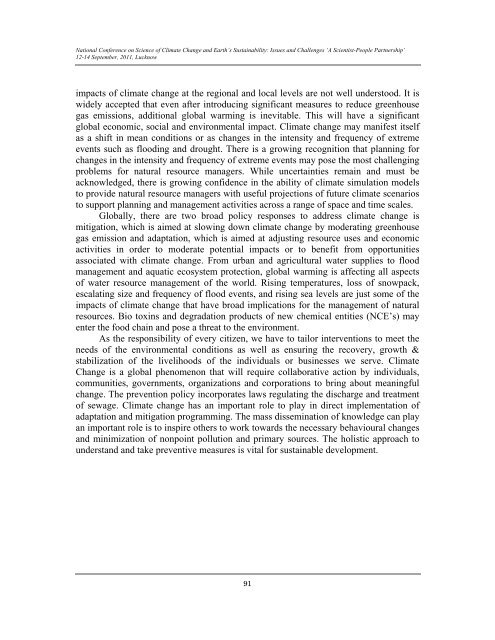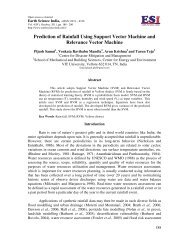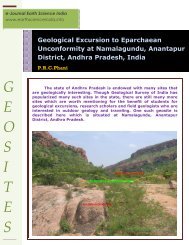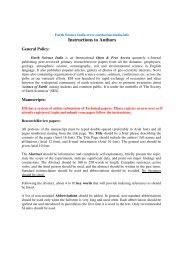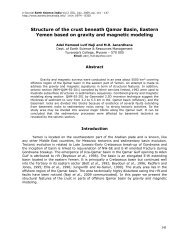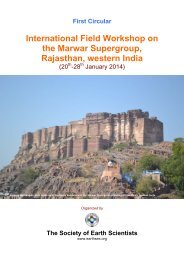12-14 September, 2011, Lucknow - Earth Science India
12-14 September, 2011, Lucknow - Earth Science India
12-14 September, 2011, Lucknow - Earth Science India
You also want an ePaper? Increase the reach of your titles
YUMPU automatically turns print PDFs into web optimized ePapers that Google loves.
National Conference on <strong>Science</strong> of Climate Change and <strong>Earth</strong>’s Sustainability: Issues and Challenges ‘A Scientist-People Partnership’<br />
<strong>12</strong>-<strong>14</strong> <strong>September</strong>, <strong>2011</strong>, <strong>Lucknow</strong><br />
impacts of climate change at the regional and local levels are not well understood. It is<br />
widely accepted that even after introducing significant measures to reduce greenhouse<br />
gas emissions, additional global warming is inevitable. This will have a significant<br />
global economic, social and environmental impact. Climate change may manifest itself<br />
as a shift in mean conditions or as changes in the intensity and frequency of extreme<br />
events such as flooding and drought. There is a growing recognition that planning for<br />
changes in the intensity and frequency of extreme events may pose the most challenging<br />
problems for natural resource managers. While uncertainties remain and must be<br />
acknowledged, there is growing confidence in the ability of climate simulation models<br />
to provide natural resource managers with useful projections of future climate scenarios<br />
to support planning and management activities across a range of space and time scales.<br />
Globally, there are two broad policy responses to address climate change is<br />
mitigation, which is aimed at slowing down climate change by moderating greenhouse<br />
gas emission and adaptation, which is aimed at adjusting resource uses and economic<br />
activities in order to moderate potential impacts or to benefit from opportunities<br />
associated with climate change. From urban and agricultural water supplies to flood<br />
management and aquatic ecosystem protection, global warming is affecting all aspects<br />
of water resource management of the world. Rising temperatures, loss of snowpack,<br />
escalating size and frequency of flood events, and rising sea levels are just some of the<br />
impacts of climate change that have broad implications for the management of natural<br />
resources. Bio toxins and degradation products of new chemical entities (NCE’s) may<br />
enter the food chain and pose a threat to the environment.<br />
As the responsibility of every citizen, we have to tailor interventions to meet the<br />
needs of the environmental conditions as well as ensuring the recovery, growth &<br />
stabilization of the livelihoods of the individuals or businesses we serve. Climate<br />
Change is a global phenomenon that will require collaborative action by individuals,<br />
communities, governments, organizations and corporations to bring about meaningful<br />
change. The prevention policy incorporates laws regulating the discharge and treatment<br />
of sewage. Climate change has an important role to play in direct implementation of<br />
adaptation and mitigation programming. The mass dissemination of knowledge can play<br />
an important role is to inspire others to work towards the necessary behavioural changes<br />
and minimization of nonpoint pollution and primary sources. The holistic approach to<br />
understand and take preventive measures is vital for sustainable development.<br />
91


